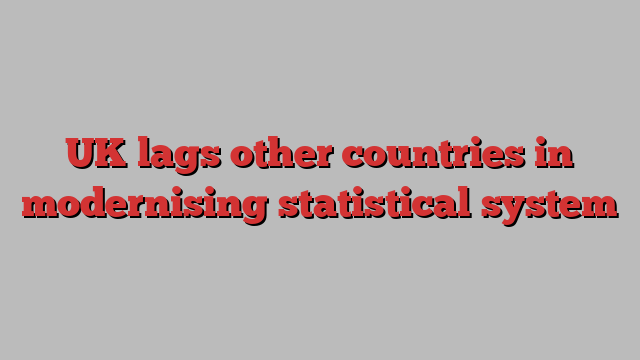
Unlock the Editor’s Digest for free
Roula Khalaf, Editor of the FT, selects her favourite stories in this weekly newsletter.
The UK is falling behind other developed countries in efforts to modernise its statistical system because government officials are unwilling to share data, according to an independent review published on Tuesday.
Professor Denise Lievesley’s report took both ministers and statisticians to task for slow progress in developing the Integrated Data Service, a cross-departmental project designed to make official data more accessible.
The platform is seen as crucial for the UK to make better use of administrative data. Set to go live next year, it comes at a time when statistics agencies around the world are struggling to run big household surveys with people becoming harder to contact and less willing to give personal details to cold callers.
The need to move away from survey-based collection has been thrown into sharp relief by the Office for National Statistics’ recent failure to produce reliable jobs data.
Lievesley told the House of Commons public administration and constitutional affairs committee that while “every rich country in the world” was developing something similar to the IDS, the UK — already at a disadvantage as it did not hold a population register — was making slower progress.
“The government really has to get a grip on this,” she said, describing the IDS as “critical” in helping “provide better services for the population”.
Other than funding constraints, she told MPs the main problem was that officials still saw it as risky to share data with other government departments, either because of privacy concerns or worries that it would reveal problems with the quality of the information.
Baroness Neville-Rolfe, a Cabinet Office minister, told the committee she accepted that “more central effort and ministerial involvement” was needed and said the government would set out plans to improve data sharing later in the year.
Lievesley’s government-commissioned review also called for greater clarity about the governance of the statistics system. Britain is unusual in having a single body — the UK Statistics Authority — overseeing both the production of official statistics, mainly through the Office for National Statistics, and their regulation, through the Office for Statistical Regulation.
She said she had seen “no tangible evidence” to support assertions that the ONS and the OSR were “too cosy”. But she urged ministers to clarify the separation of their functions and reporting arrangements in legislation, to avoid confusion that could “damage trust in official statistics”.
She also said the Cabinet Office should consider splitting the role of national statistician. The position has proved difficult to fill at the salary on offer, because of the need to combine academic expertise with business acumen.
Lievesley criticised the ONS for poor communication and said the agency needed “urgently” to improve its website, which often crashes when data is released. She also called for the UKSA to appoint a non-executive director with a background in communication.
She also questioned an anomaly in legislation that allows ministers to see some government statistics — although not those produced by the ONS — before their public release.
The government said it had no plans to change current arrangements for the pre-release of statistics. It accepted most other recommendations in principle but made it clear no legislative changes would be made before the general election expected later this year and no commitments to new funding.

